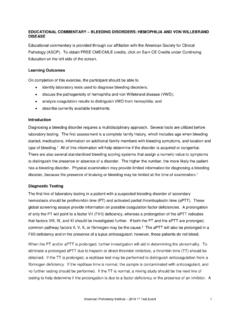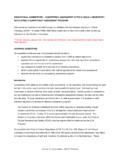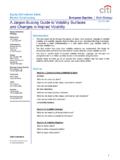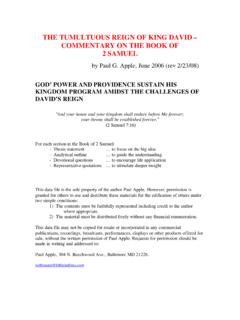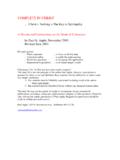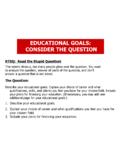Transcription of The Role of Executive Assistants as Managers and …
1 1 The Role of Executive Assistants as Managers and Leaders Submitted by Melba J. Duncan Founder & CEO, Duncan Leadership Institute Competent Executive Assistants are invaluable assets to their organizations and indispensable members of the management team. Aside from a specific competency, Assistants are often the most trusted confidant to the Executive they serve. They selflessly partner to achieve the Executive 's goals, advance the Executive 's agendas, and leverage the Executive 's time. In many instances, Executive Assistants are working without specific direction on a blank page on which they script the intent, design the structure, manage the team, and accept responsibility for the outcome. These are the people who pull things together, keep them moving, and make them happen. On behalf of their Executive employer, they are often called upon to integrate disparate elements of the company s plan to achieve fluid and seamless implementation.
2 They are often the Executive 's first line of offense and last line of defense. The role of the Executive assistant adjusts with every new innovation in technology, shift in business strategy, or change in the global economy. Versatile Executive Assistants bend to meet every curve, yet stand straight and firm to push through obstacles. They have the remarkable capability to repeatedly reinvent themselves, to hit the ground running, bounce back, and renew themselves again and again, hour after hour, day after day. They perform like Olympic gymnasts pursuing the 10-point landing in every competition. The work of the Executive assistant is fast-paced, requiring an extraordinary number of skills displayed in quick time. Processing information with a dedication to accuracy, making quick and effective decisions, grouping tasks and exercising intuitive judgments on the fly are the hallmarks of the invaluable Executive assistant .
3 The effective Executive assistant has updated the traditional Executive assistant profile with an instinct that is so often proven on point (they always seem to make the right decision with the right people) that it begs for an educational underpinning. The job description has changed and the Executive assistant has adapted; the preparation for and continuing education in the role has not kept up. The Progression of the Role The revised job description of the Executive assistant now includes role-related leadership, the management of people, relationships, projects, and teams. There is more to be accomplished with fewer people amidst limited resources. This has provided an opportunity for prepared Executive Assistants to fill the capability gap. It is important to recall that Executive Assistants have always responded to the needs 2of executives for whom having the best and the brightest on the team is a high priority.
4 Through initiative and the appropriate application of cultural awareness, analysis, communication, and decision-making, Assistants continue to transform the traditional role to one with clear strategic management and leadership responsibility and accountability. These major shifts have taken place as executives realize that their Assistants are capable of, and expected to handle, challenging assignments requiring management and leadership skills. A new Executive / Executive assistant relationship has emerged, one that could be defined as value-added colleague. The Transition to Management The new role of the Executive assistant is inextricably interwoven with management and leadership tasks. Planning, coordination, project management, time management, establishing priorities, multi-cultural relationship management, financial intelligence, strategic decision-making capability, and proactive skills are now the new norm.
5 The requirements for effective senior management leadership are mirrored in the support role of the Executive assistant . Executive Assistants are natural Managers because they understand that managing is a set of human interactions, not a series of mechanical tasks. They are the local experts who have built strong interpersonal and business relationships with executives. They are now being called upon to act in a managerial capacity. This results in a hybrid of administrative and managerial responsibilities, heretofore unpracticed, that is essential to the smooth functioning of the modern organization. With technology providing productivity advantages, they manage the Executive s time by strategizing how an Executive should spend his/her day, how much time can be allocated for each calendar entry, and which member of the team(s) should be included in the planning process.
6 Executive Assistants lead by example and devise systems to monitor implementation. They control and problem-solve issues to completion of a task. They have the ability to motivate others and to manage differences through their skills of persuasion, consolidation, and innovation. They take an idea from conception through research, analysis, collaboration, team building, execution, and follow-through. They are particularly adept at knowing what resources are available and how to make things happen on short notice. More often than not, they are the "go-to" person in the office. Skilled Executive Assistants have an acute sensitivity for the importance of time urgency, exceptional anticipation skills, laser-like intensity, enviable personal touch, and wonderfully engaging styles and personalities. They are competent, self-confident, and tough-minded.
7 They are able to grasp the big picture yet track operational detail. 3 Executive Assistants develop proficiency in building and maintaining relationships. They make effective, knowledge-based decisions. They know their Executive s objectives, and they proactively follow through behind the scenes in furtherance of corporate goals. The Transition to Leadership The emerging leadership profile is as hard to deny, as it is difficult to replicate. To effectively assume leadership responsibilities, appreciation for new levels of authority and influence have to be internalized. I define "authority" as the right to make a decision to say 'yes' and 'no'; "influence" as the ability to crystallize, frame and present issues in a manner that encourages others to support and achieve a goal. Discretion skills guide Executive Assistants in how and when to work behind the scenes for quiet victories.
8 They demonstrate the qualities that define leadership: courage, tenacity, interpersonal ability, ethical standards and goal pursuit. These are some of the key attributes which fall under the classification of Executive assistant leadership. As leaders, Executive Assistants cope with change, tolerate chaos and, most important, inspire others with great passion to offer their best efforts on behalf of a goal to which they are personally committed. Leadership is not about positional authority; it s about attitude. The best leaders desire to support and inspire others, not themselves. Executive Assistants possess the confidence and capability to skillfully provide leadership support for the senior management team of which they now are an integral part. Where You are Now Executive Assistants are strong business stakeholders in the purpose and mission of the organization; they are called upon to fill several different roles, from writer to stage manager to director.
9 As Managers and leaders, it is a comprehensive and complex responsibility, one that requires both offensive and defensive posturing. 4 The Evolved Role for Global SuccessThe Evolved Role for Global SuccessSupportLeadership/ManagementExecu tive& AssistantPartnership To operate most effectively in this evolved role, Executive Assistants have need for advanced skills, competencies and capabilities. Instinct, intuition and internal on-the-job training can get you only so far. The 21st Century Executive assistant requires a repertoire of skills in order to support executives in the current global economic order. Leadership skills: by example, encourage others to replace outdated approaches Impeccable ethical standards Distraction control: manage complexity Imposing order on chaos: attention to detail Strong knowledge of business: strategic skills, analytic thoroughness Interpersonal ease.
10 Respect for cultural differences Monitoring important issues with others in the company Managing time-sensitive, confidential tasks Facilitating successful implementation of projects A results orientation Forceful, direct, but with the ability to resist pressure Supporting and promoting company decisions and processes Building commitment through collaboration Acting as a role model and mentor Maintaining personal life balance, integrating 24/7 work demands Serve as a catalyst to create innovative new ways of managing processes To achieve this level of Executive support, Executive Assistants must pursue a course of study and a personal development agenda to acquire new and indispensable skills. The capabilities of the Executive assistant must be in line with the new workplace and the range of tasks to be accomplished. 5 Executive Assistants know that the indispensable value of the role is the ability to improve the Executive s workplace experience by adjusting to the Executive s style of doing business, while creatively channeling priorities to achieve the institutional objectives.
